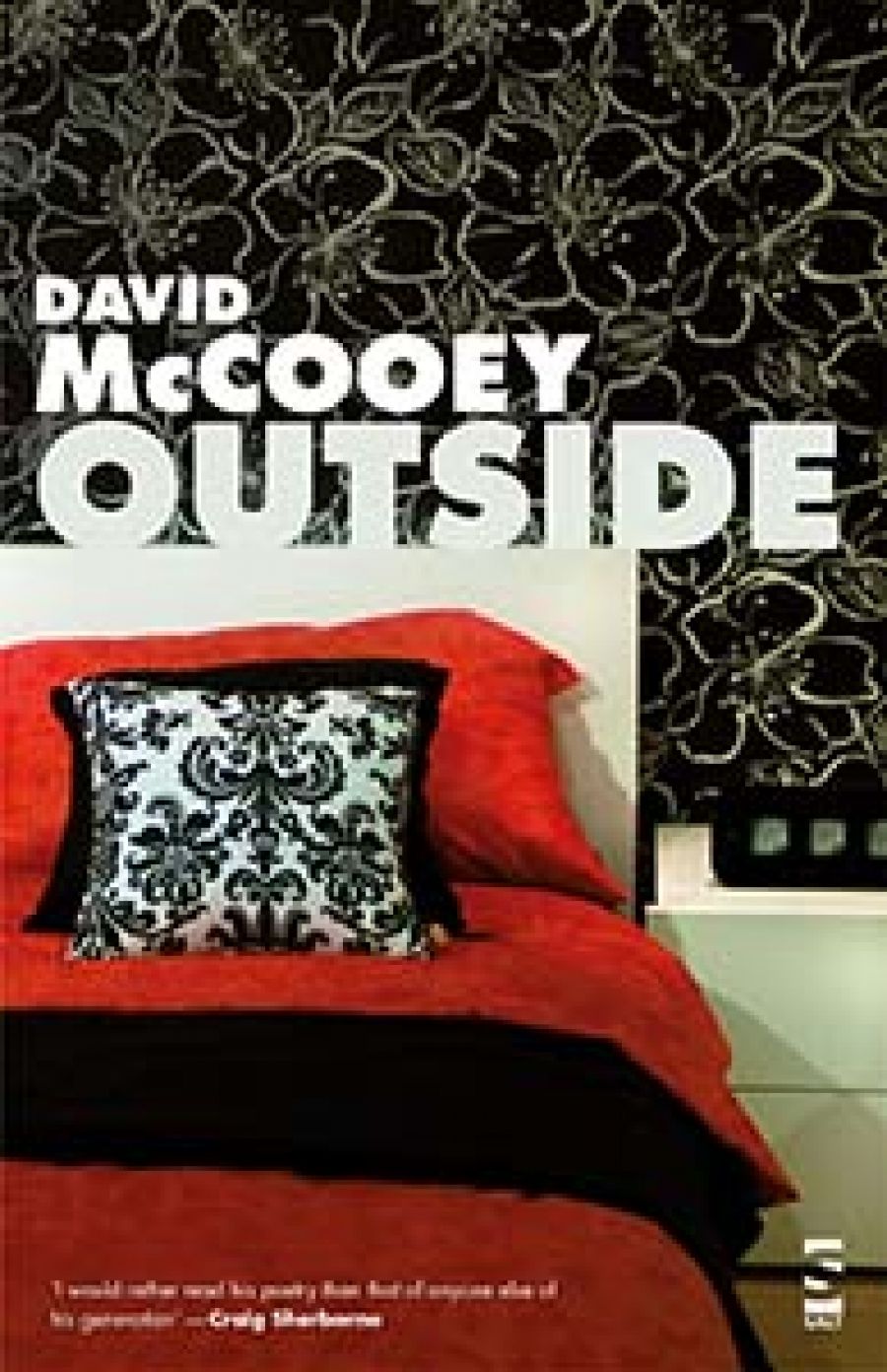
- Free Article: No
- Contents Category: Poetry
- Review Article: Yes
- Article Title: Fun with flux
- Online Only: No
- Custom Highlight Text:
Philip Larkin at thirty-one asked ‘Where can we live but days?’ It shouldn’t take half a lifetime to learn that we have night and day, yet learning how to live with this arrangement, and that this is the arrangement, is something we keep adapting to all our lives. While not a dichotomy, night and day help form the dichotomous nature of our thinking, and inform especially the method of describing and explaining everything that we call poetry. David McCooey has taken this elementary fact as first principle in creating poetry that is by turns accepting and acerbic, buoyant and bothered, carefree and careful. Outside is divided into two studied sections, one coloured by day, the second by night.
- Book 1 Title: Outside
- Book 1 Biblio: Salt Publishing, £9.99 pb, 74 pp
W.H. Auden defined a poet as one who is ‘admired for his earnest habit of calling / the sun the sun, his mind Puzzle’ and McCooey certainly falls into this category. In different poems the sun is described as ‘The sun, bold atheist, / making everything / seem as it is’; in another it is ‘the monotheistic sun / (that plants the crows’ feet near his eyes)’. If it really is the case that there is nothing outside the text, then McCooey is our contemporary in these descriptions, as well as someone we watch closely. Plainly, he has served his time deconstructing for the Department, which helps explain the recurring device of inside and outside, which acts as geography, psychic device, abacus, consolation. Still, there is also nothing new under the sun, and McCooey has his Ecclesiastes side, as when he summarises in ‘Sleep’:
Sometimes
sleep is
a mansion;
sometimes
a hole
you pull
over yourself.
Peter Porter, in one of his ‘Mutant Proverbs’, states ‘By their frights ye shall know them’, and McCooey takes up the Oulipian perverb with similar relish, e.g. ‘Don’t put all your ego in one bastard’. The line of wit is tried with increasing confidence by McCooey, a direction that comes from knowing what to say and when to stop. His grasp of English turns simple analogy into a state of being, so that in ‘Exteriors’ we find: ‘Attention of streets. / The condescension of morning air; / the heaviness of afternoon’; while in ‘Hands’ he observes ‘they never question our wishes’ and ‘when cold, they become incestuous’. He takes a leaf from the English Martian School while keeping to the page of droll Australian pragmatism, with results that are nearly always gratifying. Just as he succeeds in conveying the humours of our daily unusual usualness, so he looks steadily at those ‘frights’ by which we know ourselves. ‘Memory & Slaughter’ recounts first encounters with the violent death of animals: a chicken-killing machine, a roadkill fox on the freeway, a whaling station at Albany. Interestingly, when faced directly with mortality the language becomes more formal and prosaic, working to regularise the sense of shock. It is here we find McCooey capable of extending his tonal range and choosing an appropriate diction.
Henry David Thoreau admitted that he was ‘a parcel of vain strivings tied’. A recurring theme in McCooey’s poetry is security and stability. His is a world in need of safe signs and harbours, whatever the circumstances. But never far away in this world is longing, and there is a careful modulation between the self established in place and time and a self too aware of desire, dream, temptation. The poetry signifies the longing. One way of alleviating longing is to travel to exotic places, and an entertaining trip in this book is a diary through Peru, though this is not exactly the Johnsonian ‘extensive view’: ‘In the suburbs / of Lima, / barbed wire. / In the better suburbs, / electrified / barbed wire.’
It helps put Geelong in perspective. Another way of alleviating longing is by going to the movies, and one of the best sustained sequences is a set of enchanting philosophical reflections on the films of Stanley Kubrick. Notice the worrying worlds of meaning at work in the use of that basic Anglo-Saxon word ‘hard’ in the opening of ‘Strange Love’: ‘Politicians get hard / telling us that / a nuclear bomb is a / weapon of mass destruction.’ Or the unsettling prophetic relation of our world now, via the space ship in ‘Notes on 2001’: ‘Inside, there is the sound / of technology. / Outside, there is the sound / of nothing.’
Craig Sherborne, on the cover of this book, exclaims ‘I would rather read his poetry than that of anyone else of his generation.’ To which one is given to ask, is this a wise way to talk? Is he serious? What does this mean? There are any number of Australian poets alive today who are within cooee of McCooey. Why do publishers put ejaculations like this on the front of their books? Why do the authors let them? Certainly, we should be reading McCooey, but on his own terms, not just because of someone’s private Parnassus. Reasons why it is worth going the distance with Outside are outlined above, also McCooey’s ability to have fun with flux, his skills with different modes of English poetic, and the time he takes to get right a spectrum of experience, from our dreams of domesticity to our terrors of annihilation.


Comments powered by CComment